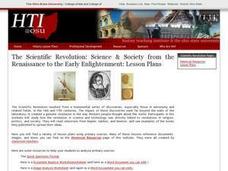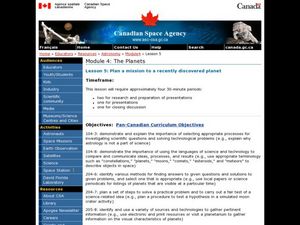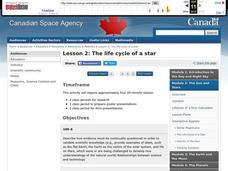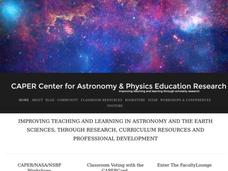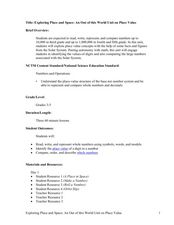Curated OER
Hubble Space Telescope
Students investigate the universe through the eyes of the Hubble space telescope. They conduct research from looking at the universe that is simulated with a digital projector. The images are projected onto the wall in a simulation of...
University of Colorado
Astro-Chronology
Class members play a version of the game Chronology to determine when certain scientific events occurred in history. Teams play until someone has 5-10 events in the correct order.
Curated OER
The Scientific Revolution
Scientists participate in studying how new scientific advances have changed the world. They explain how astronomers have changed the way people view the universe, summarize the advances that were made in chemistry and medicine, and...
Curated OER
Exploring Mars
Students, working in small groups construct scale models of the planets and solar system. They examine images of Mars and discuss what might have caused the features. They record facts about their planetary research in their journals and...
Curated OER
Black Holes
Students explore what black holes are and how gravity is associated with them. In this space lesson plan students are given enough information to imagine a journey to a black hole.
Curated OER
Plan a Mission to Recently Discovered Planet
Young scholars plan a mission to a recently discovered planet. In this science lesson plan, students research spacecraft design, distances in space, long-term missions in space, and life-sustaining planets. Young scholars work in groups...
Curated OER
Sky Pictures
Young scholars investigate constellations. In this space science lesson, students view transparencies of constellations and identify the zodiac constellations. Young scholars research the legends connected with the constellations.
Curated OER
LIFE IN SPACE Human Body: An Un-Earthly Home
Learners examine an effect of zero gravity on the human body using a baby food jar, balloons and a jar with a large mouth.
Curated OER
A DISAPPEARING ACT Astronomy: Do Stars Always Shine?
Students observe why stars are not visible during the day with a classroom demonstration using an index card punched with holes.
Curated OER
Measuring the Diameter of Our Star
Learners conduct an experiment to measure the diameter of the sun. For this astronomy lesson, students construct a simple equipment to collect scientific data. They calculate the sun's diameter using a given formula.
Curated OER
Stargazing Astronomy: A Ceiling Full of Stars
Students make an observe a planetarium using a can with nail holes, black paper and a flashlight.
Curated OER
The Life Cycle of a Star
Young scholars investigate the life cycle of a star and make conclusions based on evidence, research, and observation. In this lesson on space and scientific investigation, students describe the relationships between science and...
Curated OER
Canadian Astronauts and Astronomers
Students research the web for Canadian nationals such as Marc Garneau, Roberta Bandar and Chris Hadfield who have contributed to science and technology. In this Astronauts and astronomers lesson plan, students work in groups and are...
Curated OER
The Expanding Universe
Learners explore the expanding universe. In this science lesson, students use balloons to model the expansion of the universe. Learners take measurements of the balloon expansion and answer questions directed to develop their...
Curated OER
Chandra X-Ray Observatory
Students tour Chandra's top galactic X-ray images. In this Chandra X-Ray Observatory lesson, students play games and complete puzzles based on the Chandra Mission and X-Ray Astronomy. Students listen to pod casts, question an...
Curated OER
Exploring Place and Space
Students explore number values by completing mathematical worksheets in class. In this decimals lesson, students identify the different place values a number has and the use of decimals to represent a fraction of a number. Students...
Curated OER
Timeline of Technology
Students choose an aspect of Astronomy to research. In this instructional activity on technology, students make a timeline of notable events in the development of astronomy and aerospace technology.
Curated OER
Properties of Dust
Students examine the dust in their classroom and relate it to the dust in space. In this investigative lesson students collect dust and graph their findings.
Curated OER
Star Search
Seventh graders explore stars. In this star lesson plan, 7th graders apply generalities about space objects to constellations and explore the differences between radio waves and light waves by answering essential questions in their...
Curated OER
Journey To The Solar System
Third graders engage in a lesson to find different facts and connect them to the concept of the solar system. They conduct research using the technology integration of the internet. Using the information the students create a classroom...
Curated OER
Distances to Stars
Students explore the idea of parallax. In this astronomy instructional activity, students study the distances of stars. They investigate how parallax can be used to determine these distances.
Curated OER
Stellar Observations
Ninth graders study the uses of spectroscopy and the operation of the Hubble space telescope. In this astronomy lesson students complete a lab activity that includes graphing star color and temperature.
Curated OER
How Do We Explore Strange Environments?
Students identify and label the different parts of a robot, rover, or a spacecraft. They discuss and record all of the features their robot will need to accomplish its mission and be able to explain why they chose these features to...
Curated OER
Categorizing Celestial Objects
Students work together to develop a classification system for planets. They take a class vote and read an article about an astronomer's classification system. They write an essay on how scientists make decisions for the general public.




